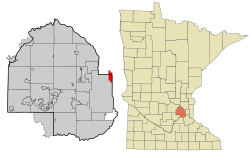St. Anthony, Minnesota
|
City of St. Anthony Saint Anthony Village |
|
|---|---|
| City | |

New urbanism on the site of former Apache Plaza
|
|
| Nickname(s): The Village | |
| Motto: "A Village Within the City" | |
 Location of the city of St. Anthony within Hennepin and Ramsey Counties in the state of Minnesota |
|
| Coordinates: 45°1′13″N 93°13′4″W / 45.02028°N 93.21778°WCoordinates: 45°1′13″N 93°13′4″W / 45.02028°N 93.21778°W | |
| Country | United States |
| State | Minnesota |
| County | Hennepin, Ramsey |
| Established (township) | 1861 |
| Incorporated | 1945 |
| Government | |
| • Mayor | Jerry Faust |
| Area | |
| • Total | 2.37 sq mi (6.14 km2) |
| • Land | 2.25 sq mi (5.83 km2) |
| • Water | 0.12 sq mi (0.31 km2) |
| Elevation | 830 ft (264 m) |
| Population (2010) | |
| • Total | 8,226 |
| • Estimate (2013) | 8,583 |
| • Density | 3,656.0/sq mi (1,411.6/km2) |
| Time zone | CST (UTC-6) |
| • Summer (DST) | CDT (UTC-5) |
| ZIP codes | 55401–55487 |
| Area code(s) | 612 |
| GNIS feature ID | |
| Website | www |
St. Anthony, also known as Saint Anthony Village, is a city in Hennepin and Ramsey counties in the U.S. state of Minnesota. At the 2010 census the population was 8,226, of whom 5,156 lived in the larger Hennepin County part of the city and 3,070 in the Ramsey County part. The city is run by a five-member council consisting of a mayor and four council members who serve four-year terms.
St. Anthony was also the name of Minneapolis's older twin city, across from downtown Minneapolis on the Mississippi River's east bank. Minneapolis and St. Anthony merged in 1872. There is also a city named St. Anthony in Stearns County.
St. Anthony's origins date to 1838, when Franklin Steele, a storekeeper at Fort Snelling, made a claim on the land east of St. Anthony Falls. Steele did not begin developing the land until 1848, but it quickly became a center of milling and trade much like the neighboring town of Minneapolis on the land west of the falls. In 1858 the town was formally organized as the Township of St. Anthony.
In 1872, Minneapolis annexed most of St. Anthony (much of present-day Northeast Minneapolis). Roughly 1,000 acres (400 ha) of mostly agricultural land north of the city retained the name St. Anthony but remained unincorporated. In 1945, the township's residents voted 167-57 in favor of incorporating as a village. The state challenged this decision on the basis that St. Anthony was too agricultural and rural, but it was upheld by the Minnesota Supreme Court. As the city's suburbs grew outward, St. Anthony evolved from a rural township to an inner suburb.
St. Anthony was the home of Apache Plaza, the tenth indoor shopping mall in United States, which opened in October 1961. The second oldest, Southdale, lay only 15 miles (24 km) to the south and was completed in October 1956. Built in the 1950s, the St. Anthony Shopping Center was Minnesota's first strip mall and was owned by the Batista family of Cuba.
...
Wikipedia
